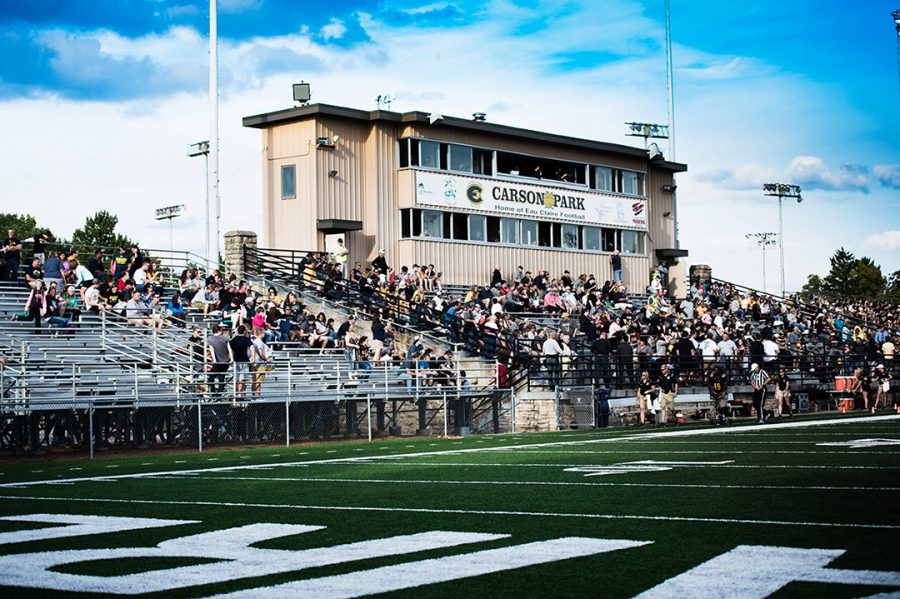A degree in sports: should it be offered?
Degrees in sports management, sports business and sports leadership are all offered, so a degree in the sports themselves should be as well
More stories from Parker Reed
Photo by Kelsey Smith
Sports are one of the few areas of interest in America where college degrees aren’t offered.
Students can earn a college degree in music but not in sports.
To earn credit for practicing a clarinet but not earn credit for practicing a sport seems incredibly odd. With both requiring long hours of preparation, practice and execution, how can one be deemed “worthy of credit” and one be considered a hobby?
It almost implies that individual sports aren’t rigorous enough to warrant a degree after four long years.
Student athletes arguably put in the most time every week on university campuses. In addition to maintaining a full course load, they must commit themselves to weekly practices, meetings, games and tournaments. Doing this requires a level of time management that most 18-22 year olds cannot begin to comprehend.
The mental capacity needed to do this is common knowledge, but an often overlooked aspect is the physical wear and tear it inflicts on student athletes. Even if sports aren’t considered “full contact sports,” athletes still experience wear and tear on their bodies due to the constant preparation and game play.
Most athletes do train and compete every week for the love of the sport they are involved in — even more so now that scholarships are turning into a thing of the past. This begs the question: Why not provide these athletes with the opportunity to turn their hard work into a useful degree?
All throughout students’ pre-college careers, they are told college is a place to foster what you love to do and build a platform to turn that passion into a career. But for sports, that is not a reality. Yes, there are degrees in kinesiology and sports management, but those areas of study tend to skate around the issue of offering degrees in individual sports.
When a lot of student athletes are scouting potential colleges, they are recruited based on their athletic potential. The programs tempt them with promises of a great college experience based on their athletic program and supplemented by the school’s academic reputation. But this proposition rings hollow when there is no promise of a future in the sport after their four years have ended.
For example, according to gcic.peachnet.edu, in basketball, about three percent of male and female high school basketball players go on to play in college. Of that three percent, only one percent become professionals. By allotting degrees in individual sports, having student athletes commit time to their sport makes logical sense.
However, adding degrees in individual sports would be beneficial to those individuals that are involved in them but they have no tangible value unless they can lead to positions after commencement has concluded.
Degrees in individual sports can lead to increased credibility in many different career paths. With more experience in a specific sport, positions as sports analysts, coaches, front office staff works and many other positions would be more attainable to the athletes who have studied them.
To defy the belief of every liberal arts college in the country, sometimes a strong background in one particular area can be more beneficial to someone in the job market — I’m still trying to find out why learning about volcanic processes will make me a better journalist.
Many naysayers of this proposition will say sports don’t have as much academic value as music, because music involves theory and other areas of study outside of practice time.
This is untrue because sports also require preparation and knowledge in other areas besides just executing on the field.
Analyzing game tape, drawing up effective plays and understanding statistical data all go into becoming great in a specific sport. Many athletes that I have spoken with put more time in inside the video room than they do in the weight room. The academic value is clear to see.
Universities offer areas of study like comic art, floral management, nannying, popular culture, puppet arts and even theme park engineering. So to not offer degrees in specific sports is ludicrous to me.
If we are going to let someone play a trumpet and earn a degree, we should let someone play basketball and earn a degree.
If you don’t feel that is a worthy comparison, then where we draw the line as far as what constitutes as “worthy of credit” needs to be made clearer. Sports are the most important thing in some students’ lives and giving them an opportunity to continue doing what they love after college ends only makes sense.


